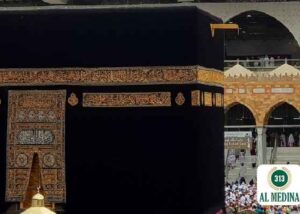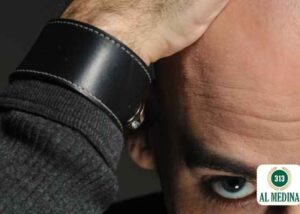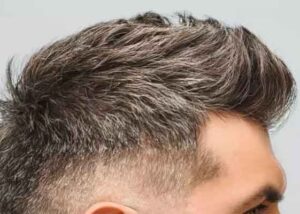Quran
Hadith
Islamic Text
Black hair dye is Makruh for men, unless they are in a situation of warfare. However, this ruling does not seem to apply to women.
عَنْ جَابِرِ بْنِ عَبْدِ اللهِ، قَالَ: أُتِيَ بِأَبِي قُحَافَةَ يَوْمَ فَتْحِ مَكَّةَ وَرَأْسُهُ وَلِحْيَتُهُ كَالثَّغَامَةِ بَيَاضًا، فَقَالَ رَسُولُ اللهِ صَلَّى اللهُ عَلَيْهِ وَسَلَّمَ: غَيِّرُوا هَذَا بِشَيْءٍ، وَاجْتَنِبُوا السَّوَادَ
(Sayidina) Jabir bin Abdillah (May Allah Most High be pleased with them both) narrated that when Abu Quhafah (Sayidina Abu Bakr’s father) was brought on the day of the Conquest of Mecca. His head and beard white like the Thaghamah plant, the Prophet ﷺ said, ‘Change this with something, but avoid black.’ (Sahih Muslim, 2102 – 79).
It is generally permitted for men and women to dye their hair. However, there is a concern if black dye is used. This is normally Makruh (disliked) for men. However dark brown is permitted. As for women, this dislike does not seem to apply. Therefore, they can dye their hair any colour.
وَمِنْهُمْ مَنْ فَرَّقَ فِي ذَلِكَ بَيْنَ الرَّجُلِ وَالْمَرْأَةِ ; فَأَجَازَهُ لَهَا دُونَ الرَّجُلِ، وَاخْتَارَهُ الْحَلِيمِيُّ. (مرقاة المفاتيح شرح مشكاة المصابيح)
Amongst them (the scholars) there were those who differentiated between men and women. Thus, they permitted it (black dye) for the woman and not for men. (Imam) al-Halimi preferred this opinion. (Imam Ali al-Qari, Mirqaat al-Mafateeh).
اخْتَار النَّوَوِيّ أَن الصَّبْغ بِالسَّوَادِ يكره كَرَاهَة تَحْرِيم. وَعَن الْحَلِيمِيّ: أَن الْكَرَاهَة خَاصَّة بِالرِّجَالِ دون النِّسَاء، فَيجوز ذَلِك للْمَرْأَة لأجل زَوجهَا. (عمدة القاري شرح صحيح البخاري)
(Imam) al-Nawawi preferred the opinion that using black dye is Makruh Tahriman. It is narrated from al-Halimi that the dislike (Karahah) is specific to men and not applicable to women. So, it is permitted for a woman if she does it for her husband. (Imam Badr al-Deen al-Ayni, Umdatu al-Qari).
يُسْتَحَبُّ لِلرَّجُلِ خِضَابُ شَعْرِهِ وَلِحْيَتِهِ وَلَوْ فِي غَيْرِ حَرْبٍ فِي الْأَصَحِّ، وَالْأَصَحُّ أَنَّهُ – عَلَيْهِ الصَّلَاةُ وَالسَّلَامُ – لَمْ يَفْعَلْهُ، وَيُكْرَهُ بِالسَّوَادِ، وَقِيلَ لَا
(قَوْلُهُ وَيُكْرَهُ بِالسَّوَادِ)
أَيْ لِغَيْرِ الْحَرْبِ. قَالَ فِي الذَّخِيرَةِ: أَمَّا الْخِضَابُ بِالسَّوَادِ لِلْغَزْوِ، لِيَكُونَ أَهْيَبَ فِي عَيْنِ الْعَدُوِّ فَهُوَ مَحْمُودٌ بِالِاتِّفَاقِ وَإِنْ لِيُزَيِّنَ نَفْسَهُ لِلنِّسَاءِ فَمَكْرُوهٌ، وَعَلَيْهِ عَامَّةُ الْمَشَايِخِ، وَبَعْضُهُمْ جَوَّزَهُ بِلَا كَرَاهَةٍ رُوِيَ عَنْ أَبِي يُوسُفَ أَنَّهُ قَالَ: كَمَا يُعْجِبُنِي أَنْ تَتَزَيَّنَ لِي يُعْجِبُهَا أَنْ أَتَزَيَّنَ لَهَا. (رد المحتار على الدر المختار)
Imam al-Haskafi: It is recommended for the man to dye his hair and beard, even if it is not in the context of warfare, according to the sound opinion. The Prophet ﷺ did not do it, according to the sound opinion. Black dye is disliked (Makruh), although it has been said that it is not (Makruh).
Imam Ibn Abideen: His saying, black is Makruh. Meaning for situations other than warfare. In al-Dhakheerah he said, as for using black dye during warfare it is recommended by agreement, since it will cause greater fear for the enemy. However, if it is to adorn oneself for women then it is Makruh. This is the view of the generality of scholars. However, some of them permitted it without dislike (Makruh). It is narrated that (Imam) Abu Yusuf said, just like it pleases me when she adorns herself for me, it pleases her that I adorn for her. (Radd al-Muhtaar).
In the Nass above, it seems to be clear that women are permitted to use black dye. Which is why Imam Abu Yusuf is quoted as permitting men to adorn just as women adorn. This in the context of black dye seems to be referring to the fact that women can use black so men should be permitted too.
وَبَعْضُهُمْ جَوَّزَ ذَلِكَ مِنْ غَيْرِ كَرَاهَةٍ وَرُوِيَ عَنْ أَبِي يُوسُفَ – رَحِمَهُ اللَّهُ تَعَالَى – أَنَّهُ قَالَ كَمَا يُعْجِبُنِي أَنْ تَتَزَيَّنَ لِي يُعْجِبُهَا أَنْ أَتَزَيَّنَ لَهَا كَذَا فِي الذَّخِيرَةِ. (الفتاوى الهندية)
This is the view of the generality of scholars. However, some of them permitted it without dislike (Makruh). It is narrated that (Imam) Abu Yusuf said, just like it pleases me when she adorns herself for me, it pleases her that I adorn for her. As has been mentioned in al-Dhakheerah. (al-Fataawa al-Hindiyah).
If a woman avoids black dye out of caution, then it is praiseworthy, since it is not explicitly addressed in the Hanafi Madhab. However, there are authoritative Nusoos (texts) in the Hanafi Madhab that allude to the prohibition on black dye being limited to men. Therefore, if a woman does use black dye, then it should not be condemned. Rather it is likely that it is permitted in the Hanafi Madhab.
عَنِ ابْنِ عَبَّاسٍ، قَالَ: قَالَ رَسُولُ اللَّهِ صَلَّى اللهُ عَلَيْهِ وَسَلَّمَ: يَكُونُ قَوْمٌ يَخْضِبُونَ فِي آخِرِ الزَّمَانِ بِالسَّوَادِ، كَحَوَاصِلِ الْحَمَامِ، لَا يَرِيحُونَ رَائِحَةَ الْجَنَّةِ
(Sayidina) Abdillah bin Abbas (May Allah Most High be pleased with them both) narrated that the Prophet ﷺ said, ‘At the end of times, there will be people who use black dye like the chests of pigeons. They will not (even) smell the fragrance of paradise.’ (Abu Dawood 4212, Sahih).
And Allah Most High Knows Best
-Answered by Shaykh Noorud-deen Rashid (29.03.2023)
See also:
See also (video):






